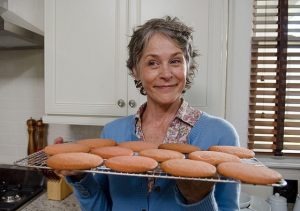Despite The Walking Dead being one of the highest rated shows on television for 6 full seasons, if you glance at comments on the internet, they’d think that the show is a total failure that doesn’t do a darned thing right. Geez, when will Robert Kirkman finally get it together and move out of his parent’s basement to make something of his life?
But I love The Walking Dead. And I love it mainly because it’s the one show that lingers in my thoughts for days after I watch it. Although Lost was another show that I’d get thinky about, most television shows are pretty disposable to me. I watch them, then immediately forget about them.
But besides the gory zombie action, The Walking Dead layers a lot of depth around their presentations of human relationships, the structure of culture and society, and ethics. It’s ethics that I want to talk about for the next 500 words, because I know how to put people to sleep like digital aerosol.
If you were to take an Ethics 101 class, the professor would most likely start you out with 3 basic approaches for talking about ethics:
- Virtue ethics, which ponders the question, “What would the virtuous person do?”
- Consequentialism, which judges the mortality of acts based on their outcomes (or consequences). Acts are moral if they lead to the happiness or benefit of the most people (the needs of the many).
- Deontology, which judges acts according to their intrinsic moral quality. What’s right is right, in other words.
 Rather than bore you further with a comprehensive ethics overview, let’s just talk about The Walking Dead through the eyes of one man. A legend, no less: Immanuel Kant. I Kant give you a full biography of Good Sir Immanuel here, so let’s sum up: Immanuel Kant was a German philosopher who is considered the central figure of modern philosophy and coined the term deontology.
Rather than bore you further with a comprehensive ethics overview, let’s just talk about The Walking Dead through the eyes of one man. A legend, no less: Immanuel Kant. I Kant give you a full biography of Good Sir Immanuel here, so let’s sum up: Immanuel Kant was a German philosopher who is considered the central figure of modern philosophy and coined the term deontology.
To Kant (and fellow deontologists like Captain America), the morality of specific acts did not depend on their consequences at all. For example, cheating on your spouse is wrong, even if it makes you happy to do so. And murder is wrong, even if the victim had it coming.
Unsurprisingly, Kant’s ethical system generates a lot of “thou shalt nots”, such as do not kill, do not steal, do not lie, and “do not end Walking Dead season 6 on a cliffhanger that’s a slap in the face to fans.”
But there is much, much more substance and depth to Kant’s ethics than he is given credit for. For instance, although he said “do not lie,” he was not saying that one had to tell the truth at all times. It may be fine to keep quiet, dodge the question, or change the subject–just as long as you don’t intentionally tell a lie aimed at harming others or for your own self-preservation. Choices like that are left up to our judgement.
But “do not kill” (even if it is oneself) seems pretty clear, right? No two ways about that one, right? Not so fast.
 In Metaphysics of Morals, Kant presented some thought experiments, one of which goes a little something like this: “a human being who had been bitten by a mad dog already felt hydrophobia coming on. He explained, in a letter he left, since as far as he knew the disease was incurable, he was taking his life lest he harm others in his madness (the onset of which he has already felt).”
In Metaphysics of Morals, Kant presented some thought experiments, one of which goes a little something like this: “a human being who had been bitten by a mad dog already felt hydrophobia coming on. He explained, in a letter he left, since as far as he knew the disease was incurable, he was taking his life lest he harm others in his madness (the onset of which he has already felt).”
Gee, instead of ‘mad dog’, just substitute ‘zombie’, and instead of ‘human being’, just substitute ‘Andrea‘ from season 3 of The Walking Dead.
Kant would concede that if the madness would violate the duty you had not to harm others, that while you technically wouldn’t be responsible for the harm as it happened, you did have a chance to prevent it, which carried a responsibility as well. It’s one of those moral pickles that philosophers are famous for getting thinky about.
For Kantians, this is an apparent case of conflicting duties or obligations, in which a person finds herself between the proverbial rock (Morgan) and the hard place (Rick). On the one hand, you have the deontonical duty not to commit suicide, but on the other hand, you have a duty not to harm others.
Good gracious, what do you do? It seems noble to us that a person would sacrifice herself to save others–that’s our definition of a hero, after all–but we don’t (and nor would Kant) assume that the hero’s life is less worthy (far from it).
To Kant and his deontological padawan Morgan, all human beings have an incalculable and incomparable worth, and one should never compare the value of one life against another (or even others, plural). That would be a consequentialist justification (see the 3 approaches above), and that’s not the way Kant rolls.
Looking specifically at the case of Andrea and her decision to kill herself, her rationality, her humanity, and her self would soon be lost to the “madness” created by the zombie bite, yet she had been socialized in an environment where learns to do “whatever you need to do to survive.” (Think of Carol who feels like she is losing her humanity despite not having a zombie bite.)
But Andrea hadn’t fully lost her ability to think for herself and had the ability to choose her actions based on her rationality and morality, which was critical for Kant. Indeed, autonomy is one of the most important concepts in Kantian ethics, representing the source of the dignity and the incomparable worth of human beings. This is key as Morgan routinely reminds Rick that he can “choose not to do” the things he does.
 Of course, despite Kant being a central figure in all of philosophy, he can at times be dismissed today. Kant focused on rational ethics and thought in terms of the greater good. Today, we’re much more emotional and focused on individual experience and well-being. That Team Rick way of thinking can be oil and water with Kant, who would be wholly Team Morgan.
Of course, despite Kant being a central figure in all of philosophy, he can at times be dismissed today. Kant focused on rational ethics and thought in terms of the greater good. Today, we’re much more emotional and focused on individual experience and well-being. That Team Rick way of thinking can be oil and water with Kant, who would be wholly Team Morgan.
So what have we learned here? I don’t know. It’s just a zombie show, after all. And I live in the suburbs, so most of my decisions revolve around if I should eat regular sugary yogurt or the healthier Greek yogurt. But thinking about ethics and The Walking Dead is good, healthy food for thought and my brain is looking to lose weight, so there’s that.

